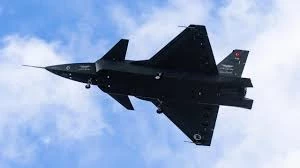

Stealth Technology: Kızılelma boasts a design that makes it difficult for enemies to detect it thanks to its radar invisibility feature. This reduces the risk of detection and offers a significant advantage in bypassing enemy defenses.
High Maneuverability: Kızılelma, with its fast and agile structure, can execute maneuvers that give it superiority over its opponents in aerial combat.
Powerful Armament: Equipped with both air-to-air and air-to-ground missiles, Kızılelma can adapt to different mission types.
Artificial Intelligence Integration: The integration of AI in Kızılelma is aimed to enable autonomous decision-making and more efficient execution of missions.
Long Range and Endurance: Designed for long-range missions, Kızılelma can stay airborne for extended periods.
Technological Leap: The Kızılelma project propels Turkey forward in aviation and space technologies. The technologies developed under this project will also benefit other defense industry projects.
Independence: By producing its combat aircraft, Turkey reduces its dependency on foreign defense industries.
Export Potential: An advanced platform like Kızılelma can attract global interest, providing significant export potential for Turkey.
Workforce and Economy: The project will provide employment opportunities for thousands and significantly contribute to the national economy.
Kızılelma is seen as a testament to the future of Turkey's defense industry. If successful, Turkey will become a key player in aviation technologies both regionally and globally. The development and production of Kızılelma will further strengthen Turkey's defense industry and enhance its international prestige.
In short, Bayraktar Kızılelma is a groundbreaking project in Turkey's aviation history. The success of this project is a crucial step towards Turkey's goal of becoming a technology-producing and developing country.
Developing a project like Bayraktar Kızılelma entails overcoming numerous engineering and technological challenges. Here are the main challenges faced during the development process:
Technological Challenges:
Stealth Technology: Achieving radar invisibility requires a complex aerodynamic design and the use of special materials. This presents significant engineering problems during both the design and production stages.
High Maneuverability: Designing an aircraft capable of successful maneuvers at both high and low speeds requires advanced control systems and a robust structure.
Autonomous Systems: Integrating AI and autonomous systems necessitates the development of complex algorithms and reliable software infrastructures.
Engine Integration: Selecting and integrating a high-performance and reliable engine for Kızılelma is of critical importance.
Production Challenges:
Precision Manufacturing: Features like stealth technology require extremely precise production processes, necessitating specialized equipment and experienced personnel, which can be costly.
Material Supply: The procurement of special materials needed for the project can present challenges in terms of logistics and customs.
Testing and Certification:
Flight Tests: Testing a new aircraft platform is a lengthy and costly process. Tests conducted in various weather conditions and scenarios help gather reliability and performance data.
International Restrictions:
Technology Transfer: Restrictions on the transfer of advanced technologies can slow down the project's progress.
Sanctions: International sanctions can create issues in procuring some critical components.
Despite these challenges, the rapid development in Turkey's defense industry and the experience of companies like Baykar have enabled the Kızılelma project to make significant progress. Successfully completing the project will further solidify Turkey's position in aviation technologies.
R&D Investments: Continuous investment in R&D is necessary for the ongoing development of the project.
International Collaborations: Joint projects with other countries will enhance knowledge sharing and accelerate technological advancements.
Use of Domestic Materials: Increasing the use of domestic materials will reduce costs and strengthen technological independence.
Training Qualified Personnel: Training qualified engineers and technicians is crucial for the project's continuity.
The Kızılelma project could be a turning point for Turkey's defense industry. Its success will boost the country's technological independence and enhance its international standing.
